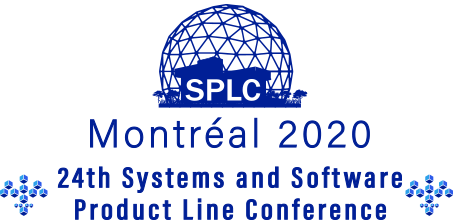Call for Papers — EMSE Special Issue on “Software Product Lines and Variability-rich Systems”
A special issue of the Empirical Software Engineering Journal.
https://emsejournal.github.io/special_issues/2021_Software_Product_Lines_and_Variability-rich_Systems
Editors of the Special Issue
- Philippe Collet, Université Côte d’Azur, France
- Sarah Nadi, University of Alberta, Canada
- Christoph Seidl, IT University of Copenhagen, Denmark
- Leopoldo Teixeira, Federal University of Pernambuco, Brazil
Contact person
- Christoph Seidl
Scope
This special issue in the Empirical Software Engineering journal is intended to provide the research community with a valuable collection of current, high-quality research articles that explore the current state of software product lines and variability-rich systems with empirical studies.
The special issue will pay particular attention to research and industrial works and their experimentations on new advances in software product lines and variability-rich systems that bridge or cross-fertilize related areas, such as configurable systems, product configuration, and software variability in all its forms. It is currently hard to find a market segment in which there is no pressing demand for frequent advances in customized or configurable hardware and software. At the same time, all stakeholders, including managers, marketers, developers, and customers, want to explore the ever evolving configuration space and understand the consequences of their decisions on their assets, from their catalog of products to some existing and running systems. From mass customization and configuration at the domain level to variability management and discovery at the code level, there is an extensive range of research problems still to be explored.
Submission Topics
The following list of topics aims to summarize targeted areas in more detail, whereas we also invite submissions to related topics.
- Business and development processes of variability-rich systems
- Domain analysis, requirements engineering, and feature traceability
- Variability management and variability modeling
- Specification, architecture, modeling, and visualization of product lines
- Realization and implementation techniques for variation or reuse (e.g., programming languages, model-driven approaches, domain-specific languages, components, services, frameworks, preprocessors, feature toggles, version or variation control systems)
- Validation, verification (e.g., static quality assurance techniques, testing, debugging, repair), security, safety, and synthesis of product lines
- Modeling, analysis, and optimization of non-functional properties (e.g., performance, energy efficiency, interoperability, adaptability, maintainability, dependability, reuse, scalability, reliability)
- Evolution, maintenance, and continuous integration or deployment for product lines or configurable systems (e.g., DevOps)
- Reverse engineering, variability mining, and refactoring of variability (e.g., migration from clone-and-own, design patterns, variability in legacy systems)
- Multi product lines, software ecosystems, program families, product lines of product lines, systems of systems
- (Self-)adaptive systems, reconfigurable systems, and dynamic software product lines
- Applications to emerging technologies or systems (Cyber-physical systems, big data, sustainability)
- Human and social aspects of product lines (e.g., collaborative modeling and development, cooperative configuration processes, program comprehension)
- Recommendation systems for configurations and/or feature models (e.g., SAT solvers, BDD, CSP solvers, SMT solvers, answer set programming, explanations)
- Machine learning and artificial intelligence (AI) for product lines & product lines for machine learning and AI applications
Submissions
Empirical Software Engineering (http://link.springer.com/journal/10664) provides a forum for applied software engineering research with a strong empirical component and a venue for publishing empirical results relevant to both researchers and practitioners. Submitted papers must have a strong empirical basis/component to be eligible for this special issue.
In addition to the open call for papers, all authors of SPLC with an accepted paper to the Systems and Software Product Lines Conference (SPLC) are encouraged to submit extended versions of their work on software product lines or variability-rich systems. To comply with the goals of a journal publication, we are asking to revise and substantially extend any original SPLC 2020 papers. Some possible extensions can be adding additional practical applications determined through case studies or experiments, an additional empirical validation, systematic comparisons with other approaches, or a sound theoretical foundation. Revised papers should explicitly explain how they extend the original SPLC papers.
The submissions will all be reviewed using the Empirical Software Engineering Journal standards. The co-editors will not be permitted to submit manuscripts for consideration in the special issue.
Papers will undergo a rigorous reviewing process which for extended papers may include some of the reviewers of the original SPLC 2020 paper as well as some new reviewers.
Submission Instructions
Papers should be submitted through the Empirical Software Engineering editorial manager website (http://www.editorialmanager.com/emse/) as follows (1) select “Research Papers” and (2) later on the Additional Information page:
- Answer “Yes” to “Does this paper belong to a special issue?”
- And select “Software Product Lines and Variability-rich Systems” for “Please select the issue your manuscript belongs to”.
For formatting guidelines as well as submission instructions, visit http://www.springer.com/computer/swe/journal/10664?detailsPage=pltci_2530593
Schedule
Submission Deadline: Friday Jan 29 Feb 26, 2021
First Review Notification: Friday May 16, 2021 (delayed; as soon as possible)
